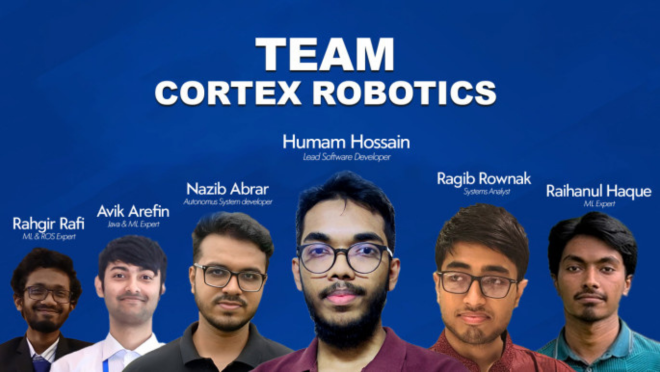Cortex Robotics to represent Bangladesh in global space robotics final
Cortex Robotics to represent Bangladesh in global space robotics final

Cortex Robotics, a team formed by students from Bangladesh University of Textiles (BUTEX) and Rajshahi University of Engineering and Technology (RUET), has earned the honour of representing Bangladesh in the international finals of the 6th Kibo Robot Programming Challenge (Kibo-RPC).
The challenge is a joint initiative by Jaxa (Japan Aerospace Exploration Agency) and NASA, where students programme robots to autonomously perform tasks aboard the International Space Station (ISS).
Outperforming over 100 teams from across Bangladesh, Cortex Robotics topped the national round with 289.13 points. Their next stop is the global finals in Japan.
“We are obviously excited. The journey was not easy. We worked very hard for this—more than 80 days at a stretch. And obviously, representing the country is always a proud and happy moment for us,” said team leader Mohammad Humam Hossain, a student from BUTEX.
The team consists of six members: Mohammad Humam Hossain (BUTEX), Nazib Abrar, Avik Arefin, Raihanul Haque, Ragib Rownak, and Rahgir Rafi, all from RUET, spanning batches 2020, 2021 and 2023. Together, they form a team of mechatronics minds and unrelenting drive.
Their task was to programme “Astrobee”, a cubic-shaped, free-flying robot that assists astronauts aboard the ISS. Astrobee is an advanced version of NASA’s earlier Spheres robot and plays a critical role in space operations, such as environmental monitoring, inventory tracking, and scientific experiments.
“This robot is designed to help astronauts; it is an incredible experience to write code that will be executed in space—on a robot orbiting the Earth,” Humam explained.
The Kibo-RPC is not merely a coding contest—it is a window to space exploration for students across the globe. The initiative came to Bangladesh in 2021, thanks to Prof Mizanur Haque Chowdhury, a NASA Astrobee scientist and founder of STEMX365.
Also affiliated with MIT and founder of the MIT Zero Robotics programme, Prof Mizanur Haque Chowdhury has been instrumental in bridging global space tech initiatives with Bangladeshi talents.
Through his leadership, Bangladesh first participated in Kibo-RPC in 2021, and the results have been promising. Teams like Enigma Systems won the Crew Award in both the 2nd and 3rd editions. In the 4th challenge, Team Paragon came fifth, while Team Mukul secured third place in 2024. Now, Cortex Robotics is carrying forward the legacy.
STEMX365 has also been selected to represent Bangladesh in the 29th Asia-Pacific Regional Space Agency Forum (APRSAF).
For a country like Bangladesh, where STEM education still struggles against infrastructural and economic odds, these achievements reflect a shift. Programmes like Kibo-RPC not only push students to dream bigger but also provide the technical framework and global exposure necessary to pursue careers in space science and robotics.
“Our expectations are very high, we have put everything into this, and we hope we can win this—not just for ourselves, but for the country,” Humam said.
Win or lose in the final round, the message is clear: Bangladeshi students are no longer just spectators in global science—they are active participants now. As Cortex Robotics prepares to compete in Japan, they carry with them not just a robot or code, but the hopes of a generation daring to reach new heights.


